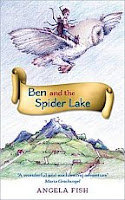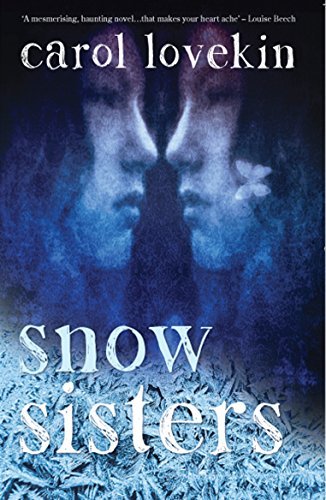
I wrote first as an early teenager – thirteen, I think.
My efforts then were largely inspired by television programmes. A favourite was
a fabulous, intelligent and prescient children’s series called ‘Timeslip’.
Looking back, I can see how this has influenced some of my writing today. It’s
a cliché to say that they don’t make them like that anymore, but, actually,
they don’t. We also had an RE teacher who once told the class that if we were
looking for stories to write we could do worse than delve into the Bible. I
took that advice on board and wrote something called ‘The Lost Scroll’. That
was probably the first time I shaped a story. I used people and, crucially,
places that I knew and still do that today, most particularly with regard to
place, though not exclusively and not always with complete faithfulness to the
original. In one of my books I consciously decided to use a character very
closely based on myself, using some personal experience. This has to be done
with great caution and with a ruthless sense of detachment. The
character must
serve the novel and not the other way around. Self-indulgence has no place in
good writing.
The biggest
influence on my desire to write in early years was when I read ‘Sons and
Lovers’ for A level. That was a revelation and I realised for the first time
what literature could be. Having said that, a few years earlier I was
enormously impressed by Alan Garner’s ‘Elidor’ and indeed all his novels, and I
would still recommend his work to anyone who hasn’t read it. His novels
(particularly the earlier ones) are categorised as children’s or teenage
literature, but stand in a class of their own as classics, irrespective of
readership age. I can’t say that anyone I knew influenced me, though I was
encouraged by one or two dear friends who knew of and understood my desire to
write, and I remain eternally grateful for that.
I think I am
most influenced by the power of place and the psychic and spiritual connection
that many people feel to it. I am also interested in trauma (including illness)
and how emergence/recovery from it can deepen that connection and root a person
in the course of their life. We live in such a disposable and superficial age
that spiritual aspiration is often seen as something to be politely ignored,
patronised or, worse, repressed. This, I think, is a terrible mistake and will
have, in the end, to be addressed. My characters are often very young, striving
to find something to believe in and with which to anchor themselves, usually
struggling with a central trauma or dilemma. All this interests me, because
although it is at its most extrovert in the young, I believe that the desire to
identify what endures in life influences people into adulthood and even old
age. Because of this drive toward continuance and timelessness, the past is
always a strong presence in my work, often spilling over into the present, or
threatening to do so. I enjoy recreating other periods – particularly the
Victorian/Edwardian era to which I have always been drawn, and this features,
or will feature, in at least two of my books. I am not drawn to powerful
figures – politicians or monarchy, for instance – but to the lives and fates of
ordinary people. These individuals often intrude on the present in my books,
and the supernatural is a strong strand in all of them, particularly the
novels. People with highly developed psychic perceptions have always fascinated
me. Such abilities, and the idea that a psychic dimension exists in the human
brain at all, are often (if not usually) dismissed nowadays. To me this is a
nonsense. The psychic facility is a natural part of the human psyche and, if it
is allowed to, can help and sustain us. I am working on a quintet of novels
called the Glasswater Quintet. The books are linked by character and place but
are not linear in sequence. They start and finish in roughly the present day
but move backwards and then forwards again in between. I am currently working on
the fourth book. I write short stories intermittently when taking a break from
the novels.
I don’t plan
meticulously when I start a book. This, to me, seems mechanical and
restrictive. I have a good idea of where I want to go, and can often envisage a
strong and dramatic denouement. However, how I reach that point is usually a
matter of exploration. Personally, I think writing should be a living,
intuitive process for it to have any real immediacy and conviction. The best
aspect of writing is the pride taken in a piece of work when the end is reached.
The worst is the constant battle against the spectres of self-doubt and the
fear of failure.
I work in a
small room decorated with lots of rich, oriental red. It contains my computer
and accessories, a mini library, a single bed and, very often, a cat. I am able
only to give a relatively short period of time a day to writing, and
consequently my daily word count is small but consistent. It is astonishing how
quickly a manuscript can build. I return constantly to a text, reworking
particular sections, even particular paragraphs or sentences, sometimes to the
brink of obsession. This can be both a good and a bad thing. Good in that a
meticulous self-scrutiny is likely to make you a better writer; bad in that,
unless you know where to draw the line, or at least to take time out, you can
easily end up not seeing the wood for the trees and becoming exhausted. Thus
far, I have had my work both proof read and copy-edited by two people. This I
find very helpful, because each sees different things and has different
suggestions to make. Being with a small publisher gives me considerable quality
control and an input on most matters, including cover art. It would not suit me
to have these things taken entirely out of my hands.
Favourite
authors – aside from D H Lawrence and Alan Garner – are Beryl Bainbridge, Daphne
du Maurier and Paul Scott (I believe Scott’s ‘Raj Quartet’ to be one of the
great works of English literature, shamefully underrated). All these authors, it
recently occurred to me, have something of the outsider about them and
consequently had/have rather strained relations with the literary
establishment.
 From the Amazon Reviews for
From the Amazon Reviews for
"On the Edge of Wild Water (The Glasswater Quintet Book 1)"
Customer Review
 Unfortunately the committee has decided not to hold a Book Fair as part of the Llandeilo Lit Fest in 2019.
Unfortunately the committee has decided not to hold a Book Fair as part of the Llandeilo Lit Fest in 2019.






 Igam Ogam: 11:00
Igam Ogam: 11:00 































